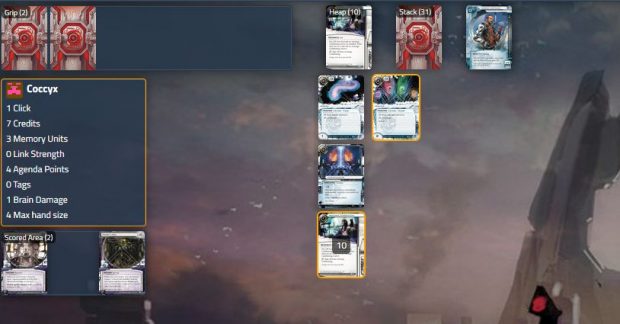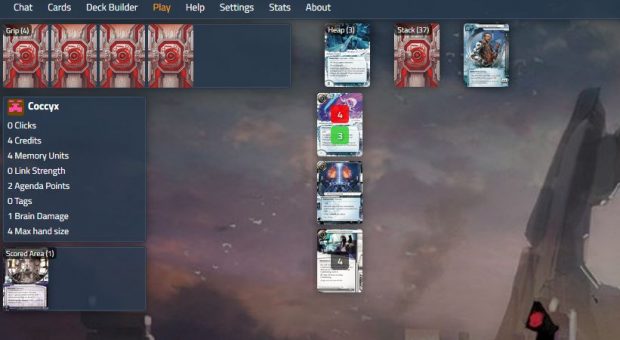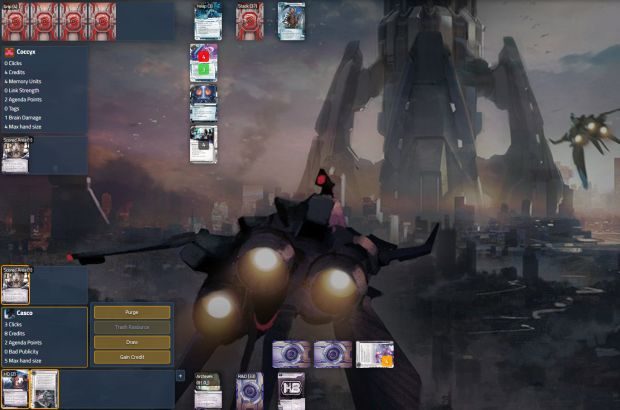Netrunner online is rough but worth the click
Click, click, click, click-BOOM
Android: Netrunner is a two-player card game set in a cyberpunk world where a hacker and a corporation angrily click their mouse buttons at each other until one of the following things happens:
1. The corporation researches a bunch of terrifying technology.
2. The hacker steals all the files the CEO accidentally left on his desktop.
3. The corporation runs out of ideas, and just sits there going: “Uhhh.”
4. The hacker dies from too much internet.
We have a much better explanation below. For now, let's say it’s a good game. The downside, however, is that it’s not a PC game. You can only play it in meatspace, with real, germ-spreading cards bought from fleshy human vendors of physical antiquities. At least, that’s how it seems. Turns out there’s an unofficial website called Jinteki.net that lets you play online for free. But is it worth the click? Matt and Brendan take a look.
Brendan: lol hi matt, asl?
Matt: Oh Brendan. You think I’m just going to give you that information?
Brendan: lol m8 c’mon i’ve got ur linkedin login anyway i know ur secrets
Matt: Aha! You’ve fallen prey to my cunning trap! Dare I say: check "m8".
Brendan: haha wat r u talking abou-- [Line disconnected --- Node not found --- Diagnostic: Total cerebral collapse]
Matt: Well, that’s pretty much exactly how a game of Netrunner goes. Need we explain more?
Brendan: [Connecting back-up Brendan] I think we should explain some things but not too much. The rules of this "living" card game are very itty-bitty and learning them is probably the most intimidating thing about it.
Matt: That’s true, and I think it’s worth saying upfront that I wouldn’t recommend playing your first game of Netrunner in this digital incarnation. There’s an overwhelming amount to pick up, and I wouldn’t fancy contending with that and the interface’s foibles at once.
Brendan: Agreed. You should put aside an evening and play against a real person first. But for those who want to know what they’re getting into, let’s simmer this game down to the gooey basics.
There are two players. One is a corporation, the other is a hacker (a “runner”). It’s an asymmetrical game in that the players have similar goals but different methods. The runner wants to get into the corp’s stack of cards and peep at them, hoping to pull out valuable “agenda” cards. If they steal enough of these, the hacker wins. The corp, meanwhile, wants to keep the hacker out while “advancing” their own agenda cards. Basically, the corp wants to spend money and time researching cool robots, and doesn’t want the runner to get their dirty hands on ‘em.
The hackers cards are laid out face-up, as if he or she is putting together the perfect computer to hack his target. The corp’s cards are played face-down, arranged like mysterious servers. These servers might host expensive robots, like I say. But they might have, uh, other things. Nasty things. The problem is: the hacker doesn’t know.
For a more thorough run-down of the rules, it’s probably best to just check the official tutorial. It's 20 minutes long and easy to get lost in, but you have to learn somehow, meatbag.
Matt: Those are just the basic rules, too! There are so many cards that change the way you have to look at a game. Even once you’re up to speed on the core rules, it’s not uncommon to have to pause for a minute or two as you figure out exactly what a new card does.
It’s intimidating, sure, but that’s part of the appeal. In some ways, Netrunner reminds me more of Dota than of other CCGs.
Brendan: Because it’s a nightmare for newbies?
Matt: Kinda! When you hear two experienced players talking to each other about the game, it’s like they’re speaking a different language. At the same time, there’s an immediate appeal that I never quite got with Magic the Gathering or other card games I’ve tried.
I think the asymmetry is at the core of that appeal. Netrunner is a game about information, where the corp player knows all and the runner has to deduce what they can from risky plays and psychological battles of wits.
Brendan: It’ll help if we give an example. Remember the time you took a “run” at one of my servers and brain damaged yourself just to get inside and see the juicy contents. But the juicy contents turned out to be a really angry AI secretary who deleted a program on your computer? That was good. I liked that.
Matt: It was awful, and I now respect you less as a person.
Nah, that’s not true. I like being the trickee almost as much as being the trickster. This is a mark of many a good game, but that feeling of “Oh, if only I’d done THAT instead” is why I love Netrunner so much. You can get screwed over by a bad hand, sure, but at the end of the day you win or lose each game because of your decisions. Your terrible, terrible decisions.
Brendan: At one point, Adam asked us if we were done playing “cyberpunk poker”, which I think perfectly describes it. As the runner, you have to constantly gamble on trying to access particular servers. In other words, you take a cyber-sprint at a row of cards on the corp’s side. But these servers will have “ice” protecting them. These are like awful antivirus protection. Firewalls designed to make you spend loads of money on expensive kit to bypass them. Or they might just be pop-up advertising that steals “clicks” from you, sapping you of the time you need to get things hacked. You can’t see any of these at first, so you’re going in blind. If it goes wrong, you might die and lose the game. Because the corp’s hidden cards can mess you up baaaad.
Matt: That really plays into the psychology of it. In our most recent game, part of the reason I lost was because I was terrified of your program-trashing ice that stung me early on. After the match was over, you revealed that everything protecting your servers wasn’t scary at all - I could have waltzed in and won the game whenever I liked.
Brendan: My corp puts on a bold front, but it’s actually just three overworked blokes sweating in a windowless office trying to sell penny stocks.
Matt: With just enough cash for one intimidating auto-turret.
Brendan: Let’s talk less about Netrunner itself for a minute and more about Jinteki.net’s implementation of Netrunner. This is the website we're playing on. You use it to build decks and play others in public or private match-ups. You build decks by sifting through dropdown menus and selecting cards. Or more easily, by pasting in a plain text file which lists all the cards you want. It turns words into decks! (We did this to get the “starter” decks we played with).
I think this part of the site is a great tool for people who know the game intimately, but less helpful than any deckbuilding page you’d find in games like Hearthstone, Gwent or Duelyst, for example. Those games have polished libraries of cards that you can zoom in and inspect, with simple click-to-add interfaces. Jinteki.net doesn’t have anything approaching that in terms of user-friendliness. It’s a good tool, I think, but often feels like a rough and ready solution to the problem: ‘there is no digital version of Netrunner’ (at least, for now). What did you think of the whole set-up?
Matt: I think that sums it up nicely. Considering how many bitty systems Netrunner has, there’s an impressive amount that it does automate for you - though we had to hash quite a few things ourselves. We both had moments where a misclick undermined 20 minutes of play, so an undo button would make a world of difference.
Even if that button ever makes it into the game, I dread to think what it would be like to play with someone who you weren't on voice comms with.
Brendan: Definitely. For veterans, it’s probably not an issue. But if you’re an inexperienced Netrunner, the way we did it is probably best. Skype, starter decks, cups of tea, and plenty of time.
Matt: This is entering uneasy legal territory, but it’s also a way of trying out cards that you don’t have access to. I’m not saying I wouldn’t do that, but it did cross my mind that using the moral reasoning that (I think) governs emulated games, playing with cards I already own is a little less dodgy?
Brendan: Right. This is why it’s MASSIVELY unofficial. I’m guessing there are a lot of people who play on Jinteki.net between tournaments and game nights, people who already own everything, who splurdge on card packs the day they’re released. But theoretically, yeah, you could use all the game’s cards without ever buying a single pack. That’d be why Fantasy Flight, the owners of the Android: Netrunner card game, sent a cease and desist notice to the programmer who designed and runs the website, Minh Tran, telling him to take it down. He still hasn’t though. And regardless of how you feel about property rights, there’s something thematically appropriate about a sizeable board game company going toe-to-toe with a single programmer.
Matt: They were hacked at one point, too!
Brendan: That’s right! Jinteki.net was hacked. So, uh, we should probably caution our readers to use unique passwords and such. I mean, you should always be doing that anyway. Given that we already occupy a Gibsonist reality.
Matt: All my passwords have ‘133T’ in them, which I believe makes me hack proof.
Brendan: You’re right. It does.
Matt: So, do you think you’ll play any more of Jinteki.net’s Netrunner?
Brendan: I’d play more if it was just you and I, or with another friend over voice chat. Because it does lack a lot of beginner-friendly features we take for granted in our CCGs. For instance, “matchmaking” here consists of pulling up a virtua-chair and saying “who wants a fight?” and then seeing who comes. You can name your game “Beginner” or “Starter deck”, and the community is probably small and tight-knit enough to be decent about new folks. But I’d always be afraid of playing too slowly for someone else. Then again, that can happen at any Netrunner meet-up.
Matt: True, though those pauses are less boring when you can study your opponent’s face for vital clues. The same goes for the things you say and your tone of voice: we both tried to mislead each other at vital moments, and you wouldn’t get that with a silent internet stranger.
Brendan: We also made plenty of mistakes, and I think there’s more leeway and forgiveness when playing with a pal online. Remember when I threw away some valuable manbots by accidentally clicking the wrong part of my screen? You just let me reset my credits and rejig things. With a stranger online, explaining that and asking for a re-do seems like bad form. In a CCG like Gwent, you wouldn’t get a re-do. You just swallow it, do a sheepish “whoops” emote and move on. Likewise, in person, like you say, playing a stranger would be different. It’d feel more forgiving. You can each see that you’re both slovenly bags of fallible flesh. Mistakes can be undone, no worries.
Brendan: So I suppose we sorta recommend Jinteki.net? It's rough around the edges, but it works, even automating a surprising amount of the card abilities. But if it’s not for the freshest newcomer, who’s it for?
Matt: People like us, I suppose, that know and love the physical version but don’t get the chance to play as often as we’d like. I remember you saying “ah, I’d forgotten how good this game is”, and I had exactly the same reaction.
Brendan: Lapsed runners, in other words. Guys and gals who’ve hung up their rig, and given up the stims. That world is behind them now. But something is stirring on the net, something UNOFFICIAL. Now, they’ve got to jack in again… for one… last… run.
Matt: Exactly. Fancy another game?
Brendan: lol kk
Jinteki.net, where you can play Netrunner online, is right here.










